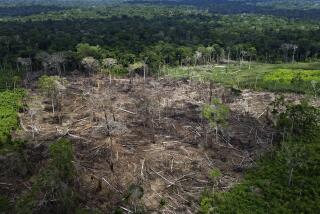If It Holds, Angolan Peace Offers Hope for Restoring Prized Coffee Production
- Share via
UIGE, Angola — The Angolan army commander pointed down a slope to a dark mass of vegetation 300 yards away on the muddy outskirts of the northern city of Uige.
“See those plants under the tall trees? That was all coffee,” he said. “But we can’t get to it.”
Uige once lay at the heart of an industry that made Angola’s coffee second only to Brazil’s, in terms of quality, and the world’s fourth-largest coffee producer. But 19 years of civil war between the government and UNITA rebels cut production to a tiny fraction of its former output.
Before independence from Portugal in 1975, Angola produced more than 200,000 tons of coffee annually. Latest figures from the National Institute of Statistics put that closer to 1,000 tons today.
Angola’s “robusta” coffee, grown mainly by Portuguese landowners, is highly praised by not only connoisseurs in U.S coffee bars, but worldwide.
“The land around Uige now, it’s like a forest,” said Vicky Matesso, country director of Angola’s National Coffee Institute. “The farms are abandoned. The trees are all old, most of them more than 30 years. They have not had attention since the wars started. There is a lot of work to do.”
Matesso said that, if a peace agreement signed last November works, Angolan coffee could make a comeback.
“We want to rehabilitate 300,000 acres of the old land. I would like to see 40,000 to 50,000 tons produced annually by Angola in three years’ time,” Matesso said.
But the cease-fire is fragile, and diplomats and ordinary Angolans have expressed pessimism over the prospects for lasting peace.
Uige, a government-held town surrounded by Jonas Savimbi’s UNITA (National Union for the Total Independence of Angola), has been described by U.N. peace monitors as a potential flash point.
“We are still not in a position to know what exactly has happened to the coffee around Uige. Nobody from our side is able to cross the lines yet,” Matesso said. “I know some of the coffee was burned while UNITA was here, partly to make charcoal, partly to make way for food crops.
“But I do not think more than 7 or 8% has been destroyed around Uige. The rest is intact, and it will be reasonably easy to rehabilitate.”
The Marxist-Leninist MPLA (Popular Movement for the Liberation of Angola) government that took over when the country achieved independence nationalized all the farms, and coffee production rapidly declined as small landholders turned from cash to food crops.
Local people in Uige said that, since 1975, a few traders had continued to buy small amounts of coffee from peasant farmers in the area, taking it north to Zaire for sale.
“We want to organize these rural markets so they are working again,” Matesso said. “This will of course be a priority not just in Uige, but all over Angola, as well as in (the northern enclave of) Cabinda.”
Coffee was also produced in the provinces neighboring Uige--Malange, Kwanza Norte, Kwanza Sul and Zaire, as well as oil-rich Cabinda, separated from the rest of the country by Zaire’s outlet to the Atlantic. Matesso said these lowland areas used to produce robusta coffee, accounting for 98% of national production.
The remaining 2% came from the central highlands in the provinces of Huambo, Benguela and Bie. They produced arabica coffee, more sought-after today on world markets.
Matesso said the rehabilitation would mainly cover robusta coffee. “I cannot see arabica making up more than 5% of Angola’s production,” he said.
The long-term plan, he said, is to introduce larger-scale commercial coffee production, but that is a few years away.
“Private enterprise now can buy coffee from the producers if they want,” Matesso said, “but they will have to respect the minimum price set by the National Coffee Institute. These minimum prices are for the defense of the producer.
“But the whole infrastructure has been destroyed. We need electrification, water. This will take a long time.”
More to Read
Sign up for Essential California
The most important California stories and recommendations in your inbox every morning.
You may occasionally receive promotional content from the Los Angeles Times.













